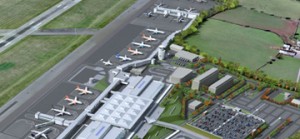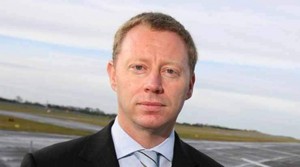Bristol Airport’s chief executive this week called on the government not to overlook the role played by regional airports in growing the UK’s economy following its long-delayed decision to support a third runway at Heathrow.
Transport Secretary Chris Grayling said the “truly momentous” decision would trigger a £61bn boost for the economy by opening up new direct trade routes and creating up to 77,000 jobs over the next 14 years. 
Bristol Airport chief executive officer Robert Sinclair, pictured below, accepted that the move reflected the government’s need to demonstrate that Britain was open for business in a post-Brexit era.
But he added: “Most passengers flying into and out of the UK use airports other than Heathrow. The benefits of increased connectivity, inbound tourism and more jobs must be spread across the whole country, not just concentrated in London.”
He said that, in particular, the role of major regional airports such as Bristol “must not be overlooked following what has been a South East-focused debate”.
He added: “The solution to capacity constraints in London has dominated the UK aviation agenda for decades yet, even with government support, a third runway at Heathrow remains many years away and better use of existing capacity must be a priority in the meantime. 
“For many passengers beyond the capital, there is another option in the shape of resurgent airports like Bristol.”
More than 8m people are expected to use Bristol next year as airlines continue to expand their route networks from the airport, which now serves 116 destinations across 30 countries, including 16 capital cities.
Planning permission is in place for further expansion to allow it to handle 10m passengers a year, pictured above, while completion of a second major terminal extension this winter will lift investment at the airport, which is owned by Ontario Teachers’ Pension Plan, to nearly £150m since 2010.
Mr Sinclair also criticised the view that people from the regions should travel to an expanded Heathrow.
“Simply funnelling passengers from all over the UK into Heathrow is not a comprehensive or sustainable transport strategy,” he said.
“More needs to be done to improve surface access to regional airports which can meet demand closer to where it arises, reducing journey times for travellers and encouraging public transport use in the process.
“Support for schemes such as the Bristol South West Economic Link in next month’s Autumn Statement would demonstrate the government’s commitment to balanced aviation growth with real benefits beyond the South East.”
He also said there were environmental factors to be taken into account.
“An expanded Heathrow would handle 10 times the current number of aircraft movements at Bristol Airport, with at least 200 times as many people affected by noise,” he said.
“This difference in scale clearly illustrates why restrictions and mitigation measures which may be required at Heathrow are not right for regional airports seeking to grow. In our view, existing structures and approaches already strike an appropriate balance for most airports and the local communities around them.”
Expanding regional airports such as Bristol was also backed by the Royal Institution of Chartered Surveyors.
Its head of policy Jeremy Blackburn said: “While the decision over Heathrow has finally provided the UK with some much-needed certainty during a time of great economic and political change, it would be naive to draw the airport debate to a close.
“Government should also consider building additional airport capacity outside of London and across the UK to meet future demands. Many regional airports are already reaching operational capacity and we must spread capacity across multiple locations and allow the UK to reach its full potential.”
Bristol handled 6.78m passengers last year – a 7.1% increase on 2014 – making it the UK’s ninth busiest airport and the fifth largest outside London.






























